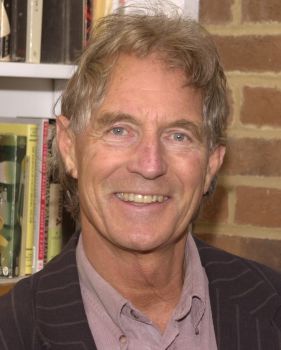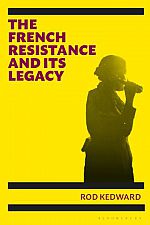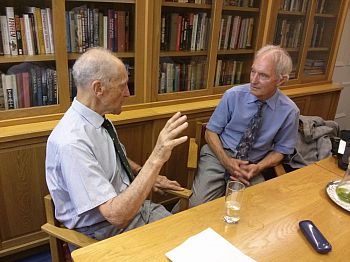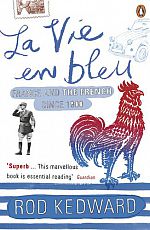Obituary: Professor Rod Kedward
Posted on behalf of: Martin Evans and Chris Warne, History Department, University of Sussex
Last updated: Wednesday, 24 May 2023

Professor Rod Kedward
Rod Kedward, a pioneering contemporary historian who greatly expanded our understanding of the historical significance of resistance, passed away on 29 April 2023.
Rod was one of the founding historians helping to establish History at the University, and a key figure in shaping its innovative outlook. Educated at Kingswood School, Bath, at Worcester College Oxford (BA in History, First Class, 1960), and at St Antony’s College Oxford (MPhil in Modern European History, 1962) he joined Sussex as Assistant Lecturer in History in the summer of 1962 where he then spent 40 years teaching and researching, becoming a Professor of European History in 1991.
The study of the French Resistance
His speciality was the history of Modern France, a passion begun early when he wrote a play at school on the Dreyfus Affair, but it was for his work on resistance in occupied France that he became best known, and especially for his trilogy of works – Resistance in Vichy France (1978), In Search of the Maquis (1993), and The French Resistance and Its Legacy (2022), which move from considering resistance in terms of ideas and motivations, through to a focus on resistance as woven into everyday life and culture, then culminating with much broader understanding of resistance as a way to shape history, politics and our lives.

The decision to focus upon the French Resistance took place early on in his career at Sussex and reflected his growing interest in the history of ordinary people, enormously influenced by E.P. Thompson’s The Making of the English Working Class, as he later explained in 2002:
I was in the Bibliothèque Nationale one day and I asked myself, who could I meet who had been caught up in the Dreyfus Affair? Probably not that many, but there were people with similar polarized positions as historical actors in the 1930s and the war years whom I could perhaps meet. I made a sudden decision to move my research forwards. It was in the summer of 1966: I would stop work on conflict in the Dreyfus Affair, and start working on conflict during the Occupation.
Above all Rod wished to recover the complexity of ordinary’s people’s resistance experiences. It was a grassroots perspective that led him to the use of oral and life history, but in working thus in the late 1960s Rod was going against the conventional wisdoms of the day. The then doyen of the Resistance, Henri Michel, was particularly suspicious of Rod’s approach as Rod later remembered:
He was the leading historian of the Resistance, who influenced all of us, but he told me that only oral reports collected at the end of the war were useful. He was worried by the problems of fabrication and fantasy. He believed the oral history I would be doing would be of that nature.
Indeed, not only did Michel feel that Rod would be deliberately misled, he also felt that Rod would find it difficult in the case of Communist Party members, to get anything other than the established party line.
Yet, armed with his tape recorder, Rod did just that and it was through his encounters with veterans of local movements that the anthropological dimensions of resistance were brought to life, a dimension that Rod then took fruitfully back to the archive and written record. He would always cite the example of discovering the ‘woman in the doorway’ as a key resistance figure – holding up the operations of policing and surveillance through apparently innocent gossip at the threshold whilst key evasive measures were being taken indoors – as only possible through seeing what role women took during the interviews he conducted with his mostly male protagonists. In keeping with the interdisciplinary ethos of Sussex, Rod wore this anthropological debt on his sleeve, whilst at the same time emphasising how it was through history that we learn the specifics of time and place.

Professor Kedward interviewing resistance veteran Steve Weiss in London, July 2014.
Rod taught many students and supervised numerous PhDs throughout his career, several of whom have themselves gone on to have highly influential careers in the fields of cultural and historical studies. He had a firm reputation amongst students for delivering inspiring and innovative contextual and thematic courses, as well as specialist courses that challenged them to think imaginatively about the past. It was as much his reputation as a teacher as a researcher that led to the invitation from Penguin to update the final volume in their series on the history of France. The result - La Vie en Bleu: France and the French Since 1900 (2006) was widely acknowledged as a magisterial addition to the series, greatly expanding our understanding of how French culture and politics is as much shaped by civic action and agency as by institutions and structures. It was in keeping with his reputation as a leading authority on the history of France that Rod was honoured by the French government with the award of Officier dans l'Ordre des Palmes Académiques in 1989, subsequently promoted to Commandeur in 2011 for “a remarkable career consecrated to the history of contemporary France ... and tireless contribution to the scholarly and university cooperation between France and the United Kingdom”.

Outside the Academia: grassroots activism and family life
Rod’s commitment to the view from below also led him into grassroots activism in Brighton. In the early 1970s he worked on an alternative newspaper, Brighton Voice, involved in such issues as squatting, anti-racism, individual rights, tenants’ protests, all from a local perspective. One of his exposés of poor housing in Brighton was taken up by the organization Shelter. Likewise, he was an active Labour Party member, campaigner, and canvasser throughout all his adult life.
Significantly, too, he was a man of many hinterlands. He was a good all-round sportsman especially as captain of cricket and rugby at Kingswood and continued to play throughout his time at Oxford, later making sure that his love of both games was passed on to his children and grandchildren. He also loved and was knowledgeable about classical music, jazz, art and film, especially modern art and French film. Singing in choirs at school and later at Sussex, he also painted, a passion that began during his teenage years cycling around Romney Marsh in Kent.
Rod had an incredible life force and the most important expression of this energy was his family, the epicentre of his life. Being a devoted husband, parent and grandparent were crucial aspects of his personality and nothing gave him greater pleasure than time being endlessly creative and patient with his children and grandchildren, a twinkle in his eye.
In retirement as Emeritus Professor, and honoured by the University with a Doctor of Letters in 2013, Rod continued to actively promote the study of resistance, playing a key role in establishing the Archive of Resistance Testimony at the Keep in 2014, as well as participating in the public outreach work of the University’s Resistance Studies Network and its partners such as the Secret WW2 Network. Rod donated his own considerable collection of interviews to the Archive, and prompted the expansion of its scope through further interviews conducted with veterans of the anti-apartheid struggle, of the Prague Spring, and with peace campaigners.
In addition to Rod's outstanding skills as a historian, he was a generous and supportive colleague, especially for those in the early stages of their career. It is a reflection of this generosity that a new funding award has been created at Sussex in honour of Rod and his wife Carol, supported by an alumnus donation, to provide conference travel grants to junior and early career researchers linked to their respective disciplines in the Media Arts and Humanities and Education and Social Work Schools.
Rod is survived by his wife Carol, an alumna from the first intake of students at Sussex and the last Dean of the School of Culture and Community Studies (CCS) at the University of Sussex. They have two children, Joshua and Jessica, and four grandchildren, Isabella, Niamh, Lucien and Rufus.
Martin Evans and Chris Warne, History Department, University of Sussex
